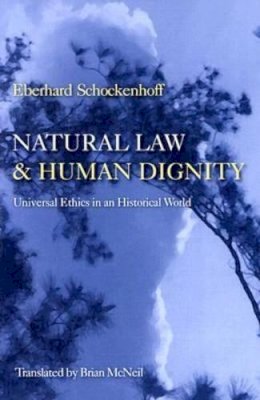
Stock image for illustration purposes only - book cover, edition or condition may vary.
Natural Law and Human Dignity: Universal Ethics in an Historical World
Eberhard Schockenhoff
€ 44.14
FREE Delivery in Ireland
Description for Natural Law and Human Dignity: Universal Ethics in an Historical World
paperback. Do human rights apply only to a certain culture group or can they be demanded of all cultures and religions? Presenting a new theological theory of natural law, this discussion about a common world ethos demonstrates how relevant and explosive that question is. Translator(s): McNeil, Brian. Num Pages: 336 pages, black & white illustrations. BIC Classification: HPQ; HRLB. Category: (G) General (US: Trade); (P) Professional & Vocational; (U) Tertiary Education (US: College). Dimension: 229 x 152 x 25. Weight in Grams: 8618.
Do human rights apply only to a certain culture group or can they be demanded of all cultures and religions? This discussion about a common world ethos demonstrates how relevant and explosive that question is. In his study of ethical relativism and historical thinking, Eberhard Schockenhoff shows how the universal recognition of fundamental norms that guarantee the minimum conditions for human existence can be substantiated.
Dealing critically with the two most important branches of research in present-day moral theology—autonomous morality and teleological ethics—the author presents a new theological-ethical theory of natural law. Integrating the theory of practical reason and Aquinas' understanding of natural inclinations, Schockenhoff compares this synthesis to the insights of present-day anthropology. This method allows him to re-establish a connection to classical natural law ethics. In so doing, he indicates how ethics can fulfill its most important duty: to arrive at the recognition of anthropologically grounded material norms without falling prey to a logical error. According to Schockenhoff, claims of natural law and of human rights formulate an indispensable minimum, while biblical ethics (the decalogue and the Sermon of the Mount) and the high ethos of the world religions point the way to an encompassing realization of the concept of the good life.
Dealing critically with the two most important branches of research in present-day moral theology—autonomous morality and teleological ethics—the author presents a new theological-ethical theory of natural law. Integrating the theory of practical reason and Aquinas' understanding of natural inclinations, Schockenhoff compares this synthesis to the insights of present-day anthropology. This method allows him to re-establish a connection to classical natural law ethics. In so doing, he indicates how ethics can fulfill its most important duty: to arrive at the recognition of anthropologically grounded material norms without falling prey to a logical error. According to Schockenhoff, claims of natural law and of human rights formulate an indispensable minimum, while biblical ethics (the decalogue and the Sermon of the Mount) and the high ethos of the world religions point the way to an encompassing realization of the concept of the good life.
Product Details
Format
Paperback
Publication date
2003
Publisher
Catholic University America Pr United States
Number of pages
336
Condition
New
Number of Pages
336
Place of Publication
Washington, United States
ISBN
9780813213408
SKU
V9780813213408
Shipping Time
Usually ships in 7 to 11 working days
Ref
99-1
About Eberhard Schockenhoff
Renowned moral theologian Eberhard Schockenhoff is professor at Albert-Ludwigs-Universität Freiburg. He is the author of numerous works and managing editor of Zeitschrift für Medizinische Ethik. Brian McNeil is a parish priest in Munich and a translator of theological literature.
Reviews for Natural Law and Human Dignity: Universal Ethics in an Historical World
